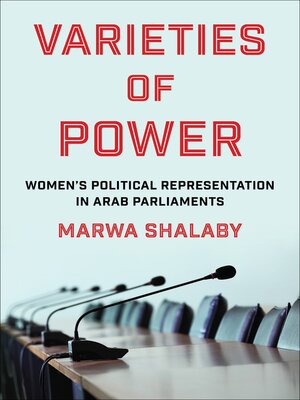Varieties of Power
ebook ∣ Women's Political Representation in Arab Parliaments · Columbia Studies in Middle East Politics
By Marwa Shalaby

Sign up to save your library
With an OverDrive account, you can save your favorite libraries for at-a-glance information about availability. Find out more about OverDrive accounts.
Find this title in Libby, the library reading app by OverDrive.



Search for a digital library with this title
Title found at these libraries:
| Library Name | Distance |
|---|---|
| Loading... |
The introduction of gender quotas has significantly increased women's representation in national legislatures—not only in democracies but also in many autocracies. To what extent has the growing number of women in authoritarian legislatures granted them more power and influence? What conditions help or hinder women's political participation under autocratic regimes? And what does the role of women tell us about the politics of authoritarianism today?
Drawing on a decade of fieldwork and a vast data set collected across the Middle East and North Africa, Marwa Shalaby develops a new theory of women's political representation in authoritarian regimes. She examines the dynamics of women's political inclusion in three Arab monarchies, Morocco, Jordan, and Kuwait, with varying levels of quota implementation and where the strength and capacity of political parties differ widely. Shalaby demonstrates that the degree to which individual parties have been institutionalized plays a significant role in women's legislative behavior and political power. Parties play integral roles in recruiting, cultivating, supporting, and elevating female candidates in contexts where women have been excluded from existing networks of power, in nondemocratic systems as well as democracies. Although the introduction of quota systems has expanded women's numerical presence, the absence of institutionalized parties has limited their ability to gain influence. Nuanced and incisive, Varieties of Power offers grounded, comparative insights into the study of gender and politics, political representation, and authoritarianism in the Middle East and North Africa.







